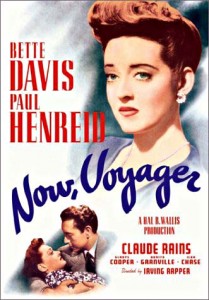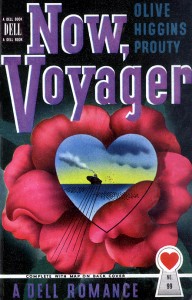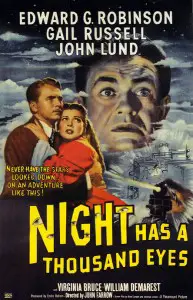 How many times can that be stated, I wonder? Naturally, it is assumed the opposite is true, that the book is sacred, and no cinematic representation can enhance it to the extent that the final result is more satisfying, or artistically superior than the original thoughts laid down on paper by the author.
How many times can that be stated, I wonder? Naturally, it is assumed the opposite is true, that the book is sacred, and no cinematic representation can enhance it to the extent that the final result is more satisfying, or artistically superior than the original thoughts laid down on paper by the author.
One of the most likely things to occur after a book is bought for film rights, is the ensuing result bears absolutely no resemblance at all to the original source. I happen to be a classic film buff, and obviously a lover of books, so I’ve experienced a number of favorite titles being transformed into film, with mixed results. What makes or breaks an adaptation? The screenwriter and director.
I remember an author making it clear that once the book is out of their hands, there’s nothing more to be done in regards to keeping the film true to the story. But the writer also pointed out something I hadn’t thought of, that the very nature of film is so different from the written word, it necessitates deep changes just to be watchable. Movement, flow is all important in film. In a book, time can slow down to a crawl, scenes can take place within one teeny room for days and days. Put that up on screen, and the audience has either fallen asleep or left for greener pastures eons ago. So I began contemplating which of my favorite books made great favorite films, and which failed miserably and which were more of a success artistically than the book itself.
Some are no brainers. Gone With The Wind by Margaret Mitchell– spectacular film made of a stupendous book, the appropriate cuts were made to create a cohesive plot and simplify some of the more complicated plot offshoots. To Kill a Mockingbird by Harper Lee–the screenplay by Horton Foote was perfection. The soul of the book permeates the film, while the overall length was shaved down a tad to accommodate a film’s running time. The Maltese Falcon by Dashiell Hammett–almost verbatim, the third adaptation with Bogart is as though the characters popped out of a copy of the book. Even to the Fat Man, Guttmann’s, characteristic laugh. Mystic River by Dennis Lehane, one of my favorite books of all time, was transformed on film exactly the way it reads. Deep, dark, and ultimately so sad, yet at the same time, satisfying. The reader and viewer come away with a better understanding of a particular area of the country, but also of the human condition, especially when it relates to the damage left behind in male child molestation.
spectacular film made of a stupendous book, the appropriate cuts were made to create a cohesive plot and simplify some of the more complicated plot offshoots. To Kill a Mockingbird by Harper Lee–the screenplay by Horton Foote was perfection. The soul of the book permeates the film, while the overall length was shaved down a tad to accommodate a film’s running time. The Maltese Falcon by Dashiell Hammett–almost verbatim, the third adaptation with Bogart is as though the characters popped out of a copy of the book. Even to the Fat Man, Guttmann’s, characteristic laugh. Mystic River by Dennis Lehane, one of my favorite books of all time, was transformed on film exactly the way it reads. Deep, dark, and ultimately so sad, yet at the same time, satisfying. The reader and viewer come away with a better understanding of a particular area of the country, but also of the human condition, especially when it relates to the damage left behind in male child molestation.
So which books were destroyed by film? There are so many, I’m dizzy and can’t think specifically. Wait, here’s one I know was so awful, the author vowed never to allow another book of hers to be optioned for film–that author is Sara Paretsky, and the film was based on her private investigator, V. I. Warshaswski, also the film’s title. I disliked it so much, I can’t remember which book it was supposed to be following. All I remember is the film makers decided V. I. would live in Wrigley Stadium!! Yes, the setting is Chicago and I believe the audience can appreciate this point without using a ridiculous premise. Sue Grafton, Paretsky’s sister writer in P. I. arms, has steadfastly refused optioning her works. She learned from her famous mystery author father, C. W. Grafton, how easily ones work can be destroyed by Hollywood.
If you ask some people, Mildred Pierce was grotesquely mutilated. James M. Cain’s novel was used for a Joan Crawford vehicle, and as such, the finer points of the plot and general storyline were changed. Although I love the film, I can’t say it represents the book. This is one time where the film is neither terrible, nor true to the original source, but takes the subject matter and creates something else with it that is very compelling. Right or wrong, when Mildred strikes Vera across the face, the original book is not on my mind, just how satisfying the sound of the slap is! Rear Window, the Alfred Hitchcock classic was originally based upon a short story by Cornell Woolrich-however the only similarity is the title. Everything else are the screenwriter and director’s embellishments. Better or worse? The film is great, the short story, unfortunately, forgettable, which is unusual with Woolrich. The Night Has a Thousand Eyes, is a novel also by Woolrich adapted into a film with Edward G. Robinson. Although it doesn’t stick perfectly to the plot of a clairvoyant deciding the future, it does have a satisfying plot line in its own right. I’d love this title to be treated with a faithful adaptation and see what film makers would do with it.
The Lovely Bones by Alice Sebold is an example where the visual eclipses the plot much of the film, and the deeper inner life of the story tends to get lost. I loved the book, it had humor as well as pathos and a much more convoluted and emotionally complicated storyline than the film could tell in the 2 hours timeline. The voice of the dead teenager doesn’t evoke the same kind of feelings one gets from reading her thoughts on paper.
 So to the subject line of the article–what movies are better? I can think of one off the top of my head–no make that two. First, Now, Voyager, about a spinster’s found independence from an overbearing mother, and her sexual awakening, the book is a lukewarm romance by a nearly forgotten 30s author, Olive Higgins Prouty. The film, however, is forever associated with two cigarettes being lit in one mouth, with one suggestively given to the smoker’s lover. Parody aside, the magnificent retelling of the story with sharp dialog, fantastic actors, and great direction turns a pedestrian love story into a polished work of physcological study and triumph over adversity.
So to the subject line of the article–what movies are better? I can think of one off the top of my head–no make that two. First, Now, Voyager, about a spinster’s found independence from an overbearing mother, and her sexual awakening, the book is a lukewarm romance by a nearly forgotten 30s author, Olive Higgins Prouty. The film, however, is forever associated with two cigarettes being lit in one mouth, with one suggestively given to the smoker’s lover. Parody aside, the magnificent retelling of the story with sharp dialog, fantastic actors, and great direction turns a pedestrian love story into a polished work of physcological study and triumph over adversity.
The other film that came immediately to mind is another sob sister, as they were called then, Random Harvest by James Hilton. The actual point of the book, I believe from scanning it (since it bore very little relationship to the film, and was entirely boring, I skimmed rather than read) is how England lost its power, but could be on the verge of re-winning it if only people would see the danger of the Nazis etc. The film took the simple premise of amnesia and created a touching wonderful story of a wealthy man’s condition due to shell shock and the intervening years of memory regained in one area, only to be lost in another, these events played against the background of political intrigue and a time span of 20 years.
These are but two of many films that ultimately came out better than the source they were based upon.
So, reader, can you think of any films that are better than the written source?
How about your opinion of some real doozy of bad films from good books?
Or, great films from great books–the best of all worlds.
Let’s inform one another, so perhaps we can find a new book to read, and then rent a film, or avoid a horrible film of a book we loved, or go see a film of a book that stinks!

Some movies which were marginally better than the books
1) Thank you for smoking
2) History of Violence
3) Road to perdition
Parth, those are interesting choices–I didn’t know that History of Violence was a book. I need to see the first two. Thanks for adding to the list!
I really like the film adaptation of The 39 Steps. Hitchcock did a terrific job on that one. I found the book by John Buchan difficult to read, although I normally like the older authors. And might I add that NO ONE has done a good Tarzan film. Nothing compares to Edgar Rice Burroughs’s Tarzan of the Apes. I must have read it half a dozen times already over the years. It’s one of my all time favorites and I’ve been disappointed in every film attempt, even the Christopher Lambert one.
The 39 Steps is wonderful, I totally agree. And I have to agree on Tarzan. What Hollywood is thinking when they make films from the books, I’ve no idea–but Johnny Weismuller shouldn’t be it! LOL.
Although I can’t think of any additional movies that out did their source material, I do whole heartedly agree with your assessment of Now, Voyager. The characters are so wonderfully crafted that you find yourself routing for Bette Davis’ character in face of every adversity she’s dealt. And when the other characters in the film begin to take up her cause you feel you somehow helped it happen from the other side of the screen. Capital article Diane!
as i love to read and rarely see a movie, the best i can come up with, diane, is a clockwork orange. the book captivated me with its language, and the movie with its visuals and shocking violence for the time. but overall, when i think about it, the book still wins, as i have reread mr. burgess but haven’t seen the movie again. and it was a kubrick film! i guess for me it was more disturbing than great.
i don’t know if i can agree with you about to kill a mockingbird. but the film is at least the stories equal. brilliantly cast and lit, i love it almost as much as my favorite book.
i think there has been some movie magic in the transition of roald dahl’s work to the big screen, the witches and matilda as examples. and when i read wicked, i remember thinking,’this would make a great movie!’
especially with terry gilliam as the designer…
thanks for getting me thinking.